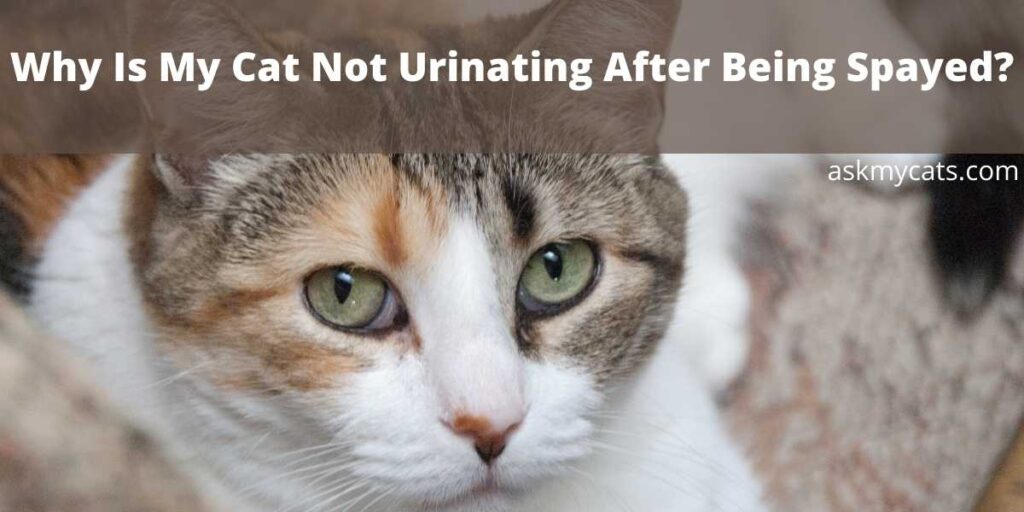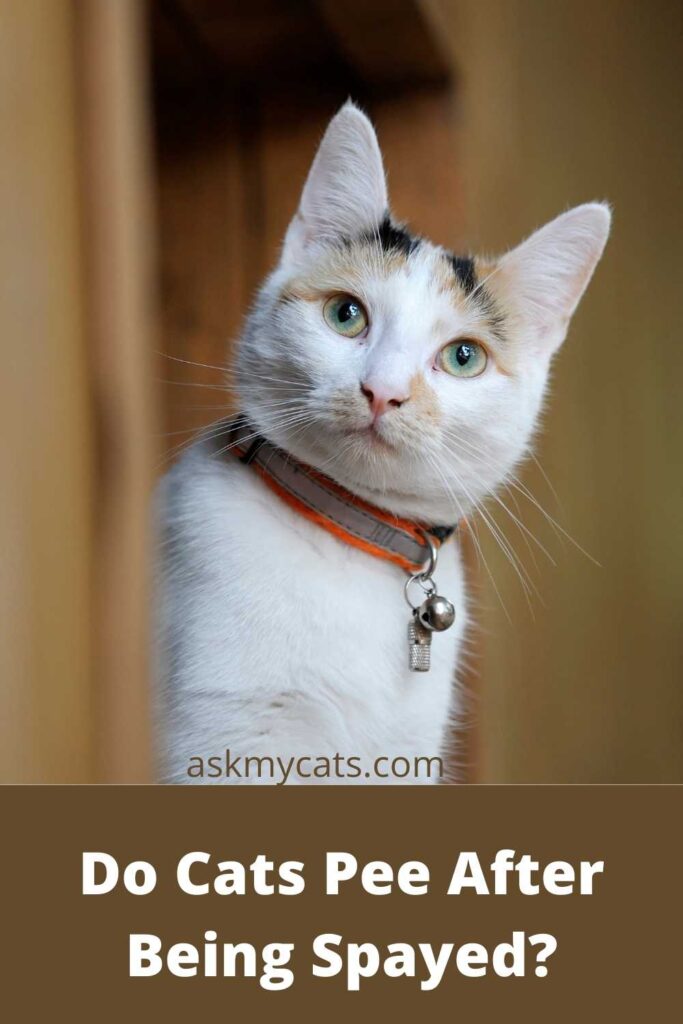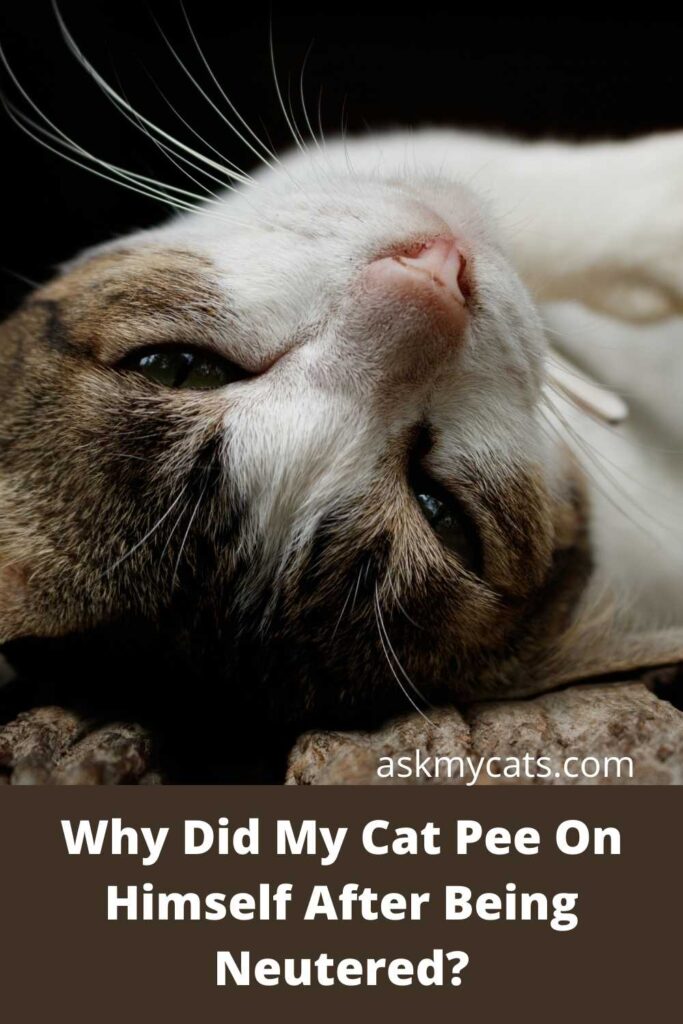Congratulations on finally getting your kitten spayed! You have done a great job being a cat parent.
But have you noticed any behavioral adjustments in her, such as less frequent use of the litter box? This must have worried you, but rest assured that by the time you read this article’s conclusion, all of your uncertainties will be resolved.
From whether it’s usual for cats to pee after surgery to how to induce your cat to pee if she isn’t, you will learn everything here.
Let’s get into it.


Give Your Cat the Perfect Day
Get the Free Ebook!
Do Cats Pee After Being Spayed?

It is a normal phenomenon if your cat doesn’t want to urinate for 24 hours post-surgery.
Your pet not going pooing or peeing the day of surgery is common. Since you denied them food the night before the procedure, their system might not currently have any food for them to digest.
In addition, your cat’s bladder is frequently expressed right before surgery, and/or your pet has already urinated or defecated by then.
During recovery, keep an eye on your cat to ensure appropriate urination and elimination. Urination should be closely watched for the first 24 hours following surgery because ovariohysterectomy risks causing injury to the urinary system.
You can stop keeping an eye on your cat’s urinating patterns as long as it eliminates within the first 24 hours. Although constipation could happen, most cats should recover from surgery with normal bowel movements.
Depending on how each cat responds to the anesthesia, it can result in soft stools or constipation.
It is a medical emergency if you realize that your cat hasn’t urinated in the past 5 days. Contact an emergency clinic or your veterinarian right away.
Contact your veterinarian to find out the next steps in your cat’s care if you notice diarrhea that lasts longer than 24 hours or constipation that lasts longer than 2 days.
Please refrain from giving your cat over-the-counter drugs or human food products to treat these diseases, as many of these items may contain toxins or have harmful side effects.
How Often Should A Cat Pee After Being Spayed?
It is okay if your cat returns to her normal peeing habit (2-3 times a day) after she has been spayed, but if she doesn’t urinate or defecate for 72 hours after the operation, consult the vet immediately.
Due to the e-collar, your pet might feel a little strange or anxious. You can temporarily remove her collar. Be careful to put the collar back on once your pet has finished eliminating it, though.
Why Did My Cat Pee On Himself After Being Neutered?

The possible reasons why your Tom peed on himself after being neutered are:
1. Instinct
A male cat may continue the behavior if he has developed the habit of using his own smell to mark his territory before being neutered. Working “alongside” him to solve a problem is always preferable to punishing him for being who he is.
It can perplex him and even make the problem worse.
Your veterinarian can provide advice on the best time to neuter your cat in order to prevent this while avoiding complications from early sterilization.
2. Stress
A male cat may continue the behavior if he has developed the habit of using his own smell to mark his territory before being neutered. Working “alongside” him to solve a problem is always preferable to punishing him for being who he is.
It can perplex him and even make the problem worse.
Our veterinarian can provide advice on the best time to neuter your cat in order to prevent this while avoiding complications from early sterilization.
Interesting Read: Do Cats Poop/Pee When They Are Scared Or Stressed?
3. Pain And Other Medical Issues
A sick cat might not be able to use the toilet. A cat’s regular urine may be affected if he is hurt or recovering from surgery without proper pain treatment.
The cat is unable to use the litter box due to bladder irritation, cystitis, or urinary tract infections. A urethral blockage (common in male cats) that stops the cat from peeing at all due to a UTI might cause “Feline Lower Urinary Tract Disease,” which can be fatal.
A UTI can be the first sign of kidney infection, a dangerous disorder that affects a crucial organ. Be cautious if the patient makes unusually many attempts to urinate (on oneself) over time, passes very little urine, or has blood in their urine.
Another dangerous condition that needs adequate care and probable dietary modifications to be treated is diabetes.
Beware of cats who drink more frequently than usual to quench their thirst and may arrive at the litter box a little late, causing them to spray in odd areas or on themselves.
You May Also Want To Know: Why Did My Cat Pee On Me? What Does It Mean?
Will My Cat Stop Peeing After He Is Neutered?
No, cats do not stop peeing completely after they have been neutered.
Peeing is a way to eliminate waste from the body, so why would any cat ever stop urinating altogether?
In the world of cats, spraying urine is not just a mating behavior. Additionally, it is a territorial action. Cats that have been neutered frequently “mark” their territory by spraying, especially if they feel threatened by visitors.
For instance, if you adopt a new pet, your fixed male cat may begin spraying to let the newcomer know who is in charge.
Your pet is using his odor to convey the above information by spraying urine. Neutering your male cat has a number of additional advantages, including minimizing the amount of sticky, stinky, and persistent pee spraying and helping to manage neighborhood cat overpopulation.
Why Is My Cat Not Peeing After Being Spayed?

Cats frequently have stress-related issues such as stress cystitis and pain reactions that can obstruct the urinary tract. Cats may experience urinary obstructions following stressful events like surgery.
When urinating, straining or vocalizing could indicate pain, discomfort, or even a urinary blockage.
Particularly in male cats, the inability to urinate is seen as a medical emergency requiring prompt medical care. Dial your pet hospital’s emergency number right away.
The bladder of a cat may enlarge and toxins from the kidneys may accumulate if it is unable to urinate. These poisons may begin to harm other bodily systems after 24 hours, which may be lethal.
If your cat exhibits any of the following symptoms, contact an emergency animal hospital to confirm a blockage and receive care:
- Hasn’t urinated at all in 12 hours
- Straining to urinate
- Vocalizing while urinating
- Looks like she is experiencing pain
- Blood in her pee
More Details: Why Do Cats Not Use Litter Boxes After Being Spayed?
What To Do If Your Cat Is Not Peeing After Spay?
Here are some post-operative care tips you can follow to ease their discomfort and induce them to pee:
- Litter dust has the potential to contaminate the surgical site. For at least a week following surgery, use uncooked, long-grain rice, shredded paper, or a brand-named litter in the litter box.
- Making your cat feel secure and at ease is crucial to the healing process. Turn off the lights and put your cat in a dark, enclosed space like the bathroom, laundry room, or kitchen.
- Water, food, and a clean litter box should all be available. Remember that after surgery, cats may hide. Access should be restricted to any locations where your cat might hide. This will make it simpler for you to keep an eye on the cat as it recovers.
- Contact the postoperative care line if any other unusual or alarming symptoms crop up that might be connected to the operation or the anesthetic. If the procedure results in the cat becoming unwell or suffering an injury, the ASPCA is ready to take responsibility.
Interesting Read: Cat Sitting In Litter But Not Peeing! Why Such Behavior?
Frequently Asked Questions
How Long Can A Spayed Cat Go Without Urinating?
Every cat has a unique set of urinating habits. Depending on your cat’s age, water intake, nutrition, and other circumstances like current medical issues, medication, heat, humidity, and stress, normal peeing may occur anywhere between two and six times per day. On the other hand, most cats poop at least once every day.
Your cat can go up to 48 hours without urinating, even if she consumes typical amounts of food and liquids. Some cats might not urinate for 72 hours after being spayed. A younger kitten often urinates four to six times daily, so if she doesn’t within a day, take her to the vet.
The toxin buildup in your cat’s system makes it more likely that they will be hurt if they don’t urinate or defecate. An increase in toxins can harm your cat’s key organs and make her sick. It might even result in death.
Final Words
That was all about spayed/neutered cats and their post-operative conditions related to urinating and defecating. There is nothing to be concerned about, just visit a doctor.
Regular checkups with the vet will not only ensure the cat’s overall health but will keep your worries away too.
Let us know in the comments section if your feline continued with her normal peeing habit after she was spayed. How did you monitor her post-surgery?
Interesting Read: Why Is My Cat Always Hungry After Being Spayed?
References
- https://www.vet.cornell.edu/departments-centers-and-institutes/cornell-feline-health-center/health-information/feline-health-topics/feline-behavior-problems-house-soiling
- https://www.vet.cornell.edu/departments-centers-and-institutes/cornell-feline-health-center/health-information/feline-health-topics/feline-lower-urinary-tract-disease
